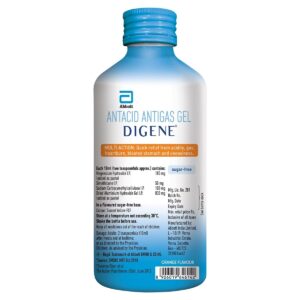A common antacid used to treat acidity, heartburn, and indigestion symptoms is called Digene syrup. It is produced and sold by Abbott Laboratories and comes in a range of flavours and strengths.
Digene Orange – Bottle of 450ml Antacid Antigas Gel. Buy Now
Magnesium hydroxide, aluminium hydroxide, and simethicone are the three main constituents in the syrup. Magnesium and aluminium hydroxides are antacids that lessen the symptoms of heartburn and indigestion by neutralising excess stomach acid. Simethicone, an anti-foaming agent, reduces gas and bloating.
Effects of Digene Syrup
Digene syrup is recommended for treating acidity, heartburn, and indigestion symptoms. Peptic ulcers and gastroesophageal reflux disease (GERD) are two more conditions it is used to treat. People of all ages, including youngsters and expectant mothers, can use the syrup.
Dosage and Administration
Depending on the patient’s condition and how well they respond to the drug, the dose and length of the course may change. To prevent any negative effects, it’s crucial to adhere to the doctor’s recommendations for dose and treatment duration.
Digene syrup should typically be taken in doses of 2 teaspoons (10ml) to 4 teaspoons (20ml), four times a day, or as prescribed by a physician. For optimal benefits, the syrup should be consumed both before and after meals. Before using, the bottle must be thoroughly shaken.
Side Effects of Digene Syrup
When used as prescribed, digene syrup is often regarded as safe and well-tolerated. Nevertheless, some people may encounter specific adverse effects include stomach pain, constipation, diarrhoea, nausea, and vomiting. Often minor and transient, these side effects do not necessitate medical treatment. But, it’s crucial to see a doctor if these adverse effects intensify or continue.
Precautions and Warnings
Those who have a history of allergies to magnesium oxide, aluminium oxide, or simethicone should take digene syrup with care.
Those with severe renal illness shouldn’t use the drug since it might cause magnesium toxicity.
Digene syrup should not be taken by women who are pregnant or nursing unless a doctor has recommended it.
The drug may interact with other drugs, including blood thinners, iron supplements, and antibiotics. Before beginning to use Digene syrup, it is crucial to tell the doctor about any drugs being taken.
Due to the possibility of sleepiness or dizziness from the drug, people should refrain from operating machinery or engaging in hazardous tasks after taking the syrup.
Conclusion
Digene syrup works well for treating acid reflux, indigestion, and heartburn symptoms. Magnesium hydroxide, aluminium hydroxide, and simethicone are all included in the syrup and act in concert to neutralise excess stomach acid and reduce bloating and gas. When used as recommended, the syrup is typically secure and well-tolerated. Before beginning the drug, patients should nevertheless let the doctor know if they have any allergies or other health issues.

